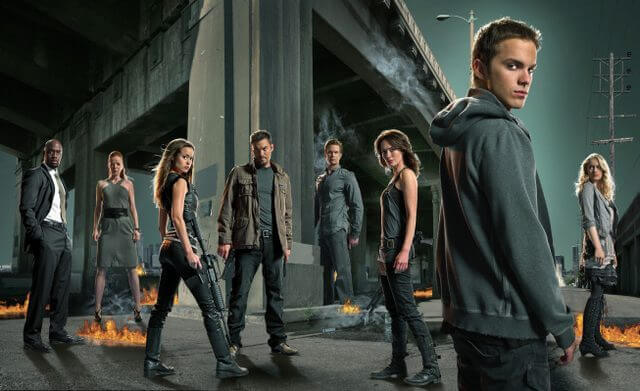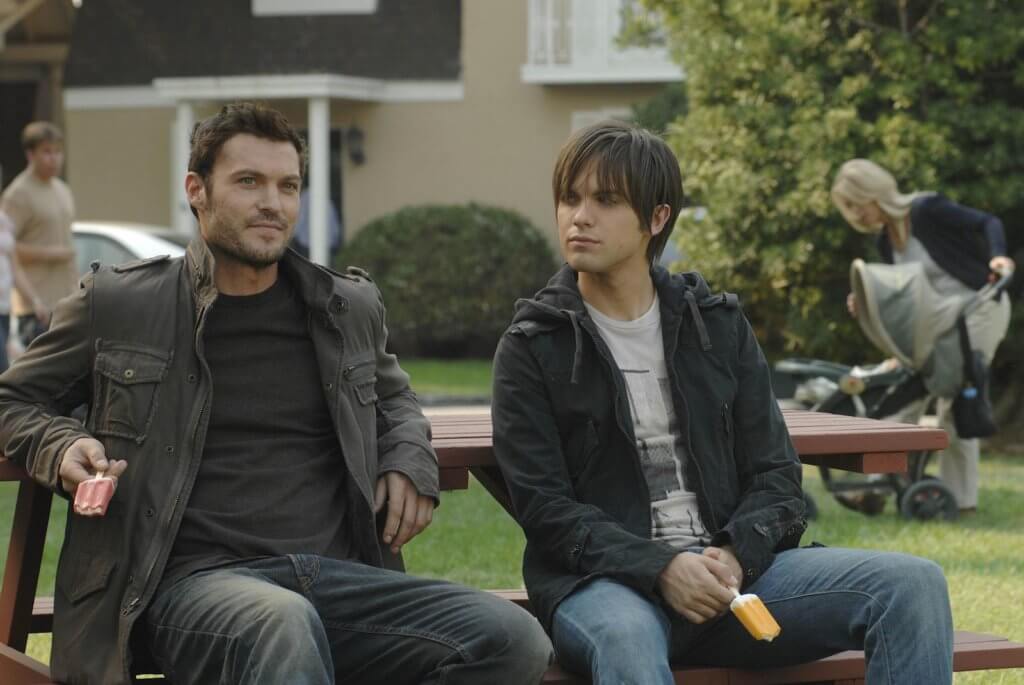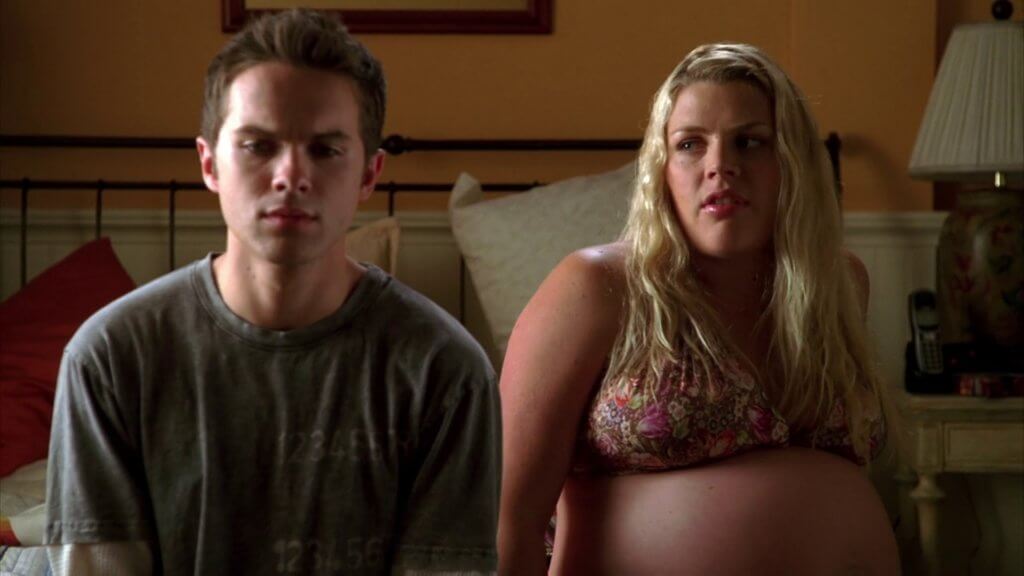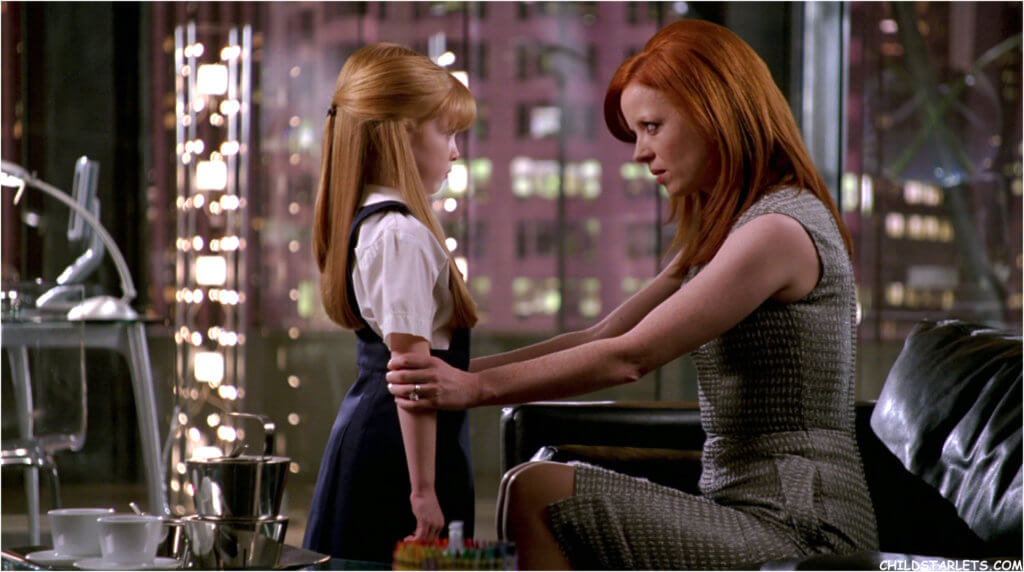In a 2017 Guardian interview, James Cameron referred to Sarah Connor as a terrible mom. A disappointing statement from the man who introduced us to her in 1984’s original Terminator movie. In that film, he gave us a character, then played by Linda Hamilton, who went from mousy waitress to barking “Get up soldier! Move it!” to her lover Kyle Reese to ensure that he completed his mission, even if it cost him his life. Terminator 2: Judgment Day (1991) shocked fans with a Sarah who could bench press a truck and who was ready to die to protect her son and save the future from the machine apocalypse brought on by SkyNet.
In 2003’s Terminator: Rise of the Machines, we’ve lost Sarah to cancer before the film begins. Hamilton herself had refused the role because the original script had reduced her to a disposable character. As such, the script was re-written to, well, dispose of her. But producer and screenwriter Josh Friedman understood — just as SkyNet does — that there is no Terminator saga or John Connor without Sarah, and as far as being a mom goes, she’s doing what a mother does best. Which is why he created Terminator: The Sarah Connor Chronicles.
Set in 1999, we meet Sarah, played by Lena Headey, six months into a relationship with Charley Dixon (Dean Winters). He has given her an engagement ring, picked out by John (Thomas Dekker). How was he to know that would trigger her flight response, picking up John and moving to another city? There, John meets a teenager named Cameron (Summer Glau) whom he quickly discovers is a Terminator sent back to protect him from the T-888 model hunting him. It turns out that despite everything Sarah did, she failed to stop SkyNet’s nuclear launch.
The Connors learn from Cameron that there have been many contingencies set in place over time by SkyNet and John’s future resistance to try to stop each other. One such plan involves a time displacement machine that jumps them forward to 2007, bypassing the timeline of the third Terminator movie, including Sarah’s death, which is addressed in the series, allowing her to remain in place to continue raising her son to be the leader of the resistance.
Whether or not The Sarah Connor Chronicles are considered canonical, Friedman shows far greater understanding of the fact that the lore of this franchise is always meant to contradict itself with seeming continuity issues. Invariably, timey whimey storylines focus on the protagonists trying very hard (and usually failing) to not mess with anything in the timeline that would consequently mess up other timelines. Terminator lore is grounded in the need to constantly change SkyNet and the resistance’s goals and methods, creating a myriad of time loops and alternate pasts and futures where, inevitably, neither side ever truly wins or loses; they only succeed in changing the game and its rules. It’s very symbolic that The Sarah Connor Chronicles’ main piece of hardware that will lead to SkyNet’s creation here is a computer created to play chess, a game bound to rules that can lead to a stalemate for its kings, John and SkyNet.
Throughout the Terminator lore, we have learned that Sarah has ensured John’s training in every aspect of warfare, from chess to weaponry, and he has his own talents with computers. What we learn through this series is that, as much training as she has given him, Sarah has not allowed him to learn the most important lesson: independence.
There are innumerable books and articles about parenting babies, toddlers, and young children, but when it comes to teenagers, parents are often left in the dark. This is a time when children are coming into their own and developing their independence is integral to their future. As any parent of teenagers knows, denying them that journey towards independence is not something that a child will tolerate for long — especially one destined to lead the resistance against killer machines and artificial intelligence.
This is the heart of the story that Friedman wanted to tell. Though he was unable to match a film’s big special effects budget, he was more concerned with character introspection, introducing us to people who would shape who John becomes in the future, while watching Sarah struggle to hold on to her son’s innocence and keep him safe and balance the preparations for that future. This lack of big budget FX and the focus on character depth (and the writers’ strike) may well be what sealed the fate of the series which was cancelled after only two seasons, but during those seasons The Sarah Connor Chronicles revealed just how strongly the heart of a Tin Man — and a mother — could beat.

Often, Headey’s voice narrates poignant moments that speak of strategic victories and losses in famous or unknown battles. Just as often, she speaks tenderly of times when she cares for her son with stories and comfort, though we don’t often get to see her acting out such moments. Hamilton’s Sarah in Terminator 2 had only harsh commands for John and hugs that sought out gunshot wounds because of the immediacy of the situation. Headey offers a softer, if no less firm touch, yet she plays Sarah with a hesitance towards being too soft with John. John can be petulant at times about this, complaining that his mom would likely forget his birthday, or give him something like a flak jacket for it. He’s angry at her for running away from Charley and from happiness for both of them. For six months, Charley had been a place of stability and grounding and a consistent, loving father figure for John. But ultimately, when Terminators keep showing up at their doorstep, John understands that his mom has his safety foremost in mind, even at the cost of her own life.
To John, she seems harsh and uncaring a lot of the time, but as more and more characters show up, they continually point out the opposite. They complain that Sarah coddles him too much, shaping a child that is too full of empathy when a ruthless strategist is what is needed for a brutal future. Derek Reese (Brian Michael Green) comes from this future, having taken orders from that John whom he has trouble reconciling with this child who is never far from tears and mercy, even for his enemies. Derek knows only a leader who will do whatever it takes, no matter the lives lost, to defeat the enemy. Sarah raises a leader who will do whatever it takes, understanding the value of the lives lost, to defeat the enemy. The more these strangers from the future get to know this John and eventually begin taking orders from him, they come to terms with the fact that Sarah did raise him right, especially when she begins to realize that it takes a village.
Where John and Sarah initially begin to clash as mother and child is with her penchant for running instead of staying to fight the future. As a young woman discovering her fate as the mother of the future, the latter was her goal. “There’s no fate but what we make for ourselves,” she echoes back to Kyle Reese in a The Terminator deleted scene, a message that John Connor himself sent back with Kyle for her. After John was born, she stayed off the grid and ensured his training, but also took it upon herself to destroy Cyberdyne Inc., the company that would go on to create SkyNet. She is caught and institutionalized, leaving John to bounce from foster home to foster home for three years, and grow bitter towards what he perceives as her abandonment.
In the series, John discovers that Sarah eventually signed papers to give him up while she was incarcerated. He is wounded by this ultimate act of parental betrayal until she explains that shortly after signing those papers, she was so filled with regret that she planned the escape we see in Terminator 2, only to run into him attempting to rescue her — and subsequently giving him hell for risking himself to do so. “I will always find you,” she tells him, and he tells her the same.
From then on, running was all they did until John starts to put his foot down in The Sarah Connor Chronicles by pulling the leader of the resistance card, just like a typical teen. “It’s always too dangerous! It’s war! War is dangerous,” John reminds Sarah in Season 1, Episode 4. “If you die, they win,” Sarah replies, before ordering John into their escape vehicle, ignoring his plan to destroy the supplies SkyNet needs to build its metal soldiers. John defies her and his strategy, after some anxious moments, proves to be effective and he exceeds in taking over 500 potential cybernetic soldiers off the board. Sarah doesn’t actually reward John with congratulations. Much like the words “I love you,” Sarah often denies or pulls back shows of affection, but in her own way shows him her approval here, as well as her pride and support.
This episode becomes the beginning of Sarah letting go of her son so that he can find out who he really is. She has always taught him to run to safety, leaving her behind if he must. But to actually let a child go — to stand back and entrust them to use the lessons we have taught them — or not — and make decisions that will define who they are and who they will become is the most difficult thing for a parent to do. Many of us parents aren’t like those birds that can easily, instinctively sit back and watch their chicks leap from nests either to crash and burn against the rocks, or stick the landing and go on to face the greater dangers of the world with that much more confidence. We want to protect our children forever and sometimes get too caught up in making decisions for them even as they become adults. I have the privilege of not raising children who will become soldiers in the apocalypse — I hope. So when I coddle and spoil them, it’s with the knowledge that I don’t need to make them rough around the edges to survive. Of course, I do have to teach them to protect themselves from the world’s many dangers, but thankfully, killer robots aren’t among them.
For Sarah, that process of letting go deepens and becomes more heartbreaking as the series progresses. When Derek joins them, he brings with him the reality of the harsh future and the understanding and expectation of what John has to become. Derek steps into the unusual family dynamic as the uncle on a mission who is suspicious of everything and everyone and solves issues by murdering everyone if Sarah or John aren’t able to stop him. His methods are questionable, but he too serves as a parental figure of his own for John, in the absence of John’s father, Derek’s brother Kyle.

Sarah also has to contend with additional influences, such as those from Cameron, who is working on the orders of future John, and with whom present John develops a bond. There are other resistance soldiers who come back in time specifically to manipulate John. One such soldier, Riley Dawson (Leven Rambin), is tasked with seducing him and getting him away from Cameron’s influence. Nothing says you’re losing your baby quite like when they start dating. That takes on a significant twist here.
In the Season 2 commentary, Friedman makes it clear that motherhood is the key element in the story he wanted to tell. This season introduces an extremely pregnant Busy Phillips as Kacy Corbin, landlady and neighbour to the Reese family. Given how the pregnant belly is often treated in mainstream media, with pregnant women becoming a target for violence, or the “inconvenience” of a pregnant actress being hidden behind props and big clothing, Phillips’ eight-month belly and breasts prominently displayed in their natural beauty and a story not focused on harm is a refreshing change.

“I’ve taken a lot of flack from people who think she’s too pregnant on the show,” Friedman explained in an io9 interview and in the commentary, but he didn’t seem bothered by those complaints because his goal was to use the character as a contrast to Sarah and what motherhood means to her. “She’s like the alternate version of Sarah Connor, if Sarah wasn’t Sarah Connor. She’s a single mother, pregnant with a son. She’s Sarah, if everything was okay. That’s kind of what I wanted to do, and really show how full she is of life and how the other characters are death-oriented.”
Through subtle ways, we see that Sarah is constantly questioning her worthiness as a mother until the episode “Goodbye to All” lays it out plainly. In the episode, she rescues a young boy targeted for termination and must play mother to him for a week while the others try to destroy the killing machine. During this time after initially trying to keep him at a distance, she reads to him, helps him with his homework, and, generally tries to give him some sense of normalcy despite the situation. In the end when she’s able to send him home, he hugs her and asks, “Are you a mom?” “Yeah, I’m a mom,” Sarah replies. “You kind of suck at it,” the boy says. “I know. I’m working on it.”
Though Sarah is the main mom in play, the second season also introduces another mother who has no less to lose and just as much to work on. Garbage lead singer Shirley Manson stepped into the role of the CEO Catherine Weaver — her first major acting role, having found that singing had lost its spark for her. Friedman initially gives us what appears to be an obvious enemy in Weaver, a ruthless corporate executive who also happens to be a T-1001, but Weaver herself has something to lose and just as many connections to John, including his desire to defeat SkyNet.

Through Cameron and another Terminator model, we learn that Terminators are constantly improving upon their infiltration techniques. Looking human isn’t enough; they must act human too. Some are effective enough to fool unknowing humans, but others, like Catherine Weaver, need more work, especially when it comes to raising a child whose dead mother she has replaced. Throughout, Catherine remains cold, but through logical analysis and support from another human, she comes to understand the emotional and psychological needs of the child, fulfilling them in a basic way that evolves over time. “We are here, first and foremost, so that I can thank you for your heroism regarding my daughter, Savannah,” Catherine says to Sarah in the final episode. “She’s the light of my life and I’d be lost without her.”
Catherine serves as a counterpoint to Sarah, a single mother who tries to be cold and distant with her son, but keeps defaulting to wanting to hold him in her arms forever. Though a Terminator can’t quite reach that level of emotion and attachment, Catherine does her best.
Catherine has a second “child” in John Henry, a reprogrammed Terminator whom she is raising to defeat the machines, much like his name sake. Again realizing her failures to understand human emotions and empathy, she enlists aid to help teach her John morality, something that was missing in SkyNet’s programming and could have prevented that AI from trying to wipe out humanity instead of seeking co-existence.
What Catherine and Sarah share as mothers is the desire to protect their children, and maybe even love, in Catherine’s own Terminator way. With this grounding their decisions, neither can be considered terrible mothers as James Cameron might define them, especially given what they know their children must face.
Parenting, under good, privileged circumstances isn’t easy for any number of reasons, but far too many women in the real world know what it means to live with war or police brutality looming over their children’s heads. They can’t afford to be the nurturing mothers that societies expect them to be. Sarah gives John tough love and raises him to be a fighter and a leader because she knows the reality he must face, and she does this no matter how many people call her crazy. Their tough love does not make them “terrible” mothers. It makes them mothers who understand what they must sacrifice to teach and protect their children, before letting them go to determine their own fates. But love is not among their sacrifices.
The Sarah Connor Chronicles reveals this every step of the way, culminating in Sarah’s final words of the season, echoing over John’s departure to the future they have shaped:
“I love you too.”

